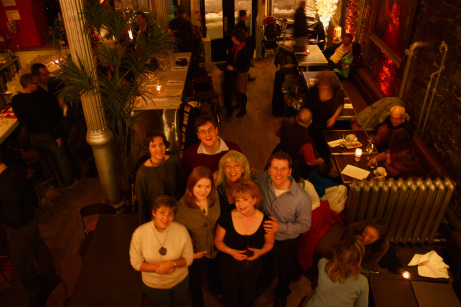Some people maintain that writing is a lonely business. In my experience, that’s not necessarily true. When I sit down to write, I am joined by a crowd of internal negative voices: the infernal censor, the cranky critic, and the whiner who keeps reminding me of all the other things I could or should be doing.
About once a month, however, I escape that crowd when I meet with my writing group to refresh my creative energies. I am not alone in this pursuit. Read the acknowledgements of first-time authors and you’re likely to find shout-outs to the people in their writing groups. For the past ten years, I have been a member of a critique group that meets to break bread, gossip, and review current work. It was with the help of this group that I crafted many of the pieces which appear in my book of nine linked short stories, Tell Me a Story, Tell Me the Truth.
The original group, which we eventually dubbed MontrealWrites, first met while taking a QWF workshop given by Ami Sands Brodoff. Ami laid down the rules for critiquing that we use to this day. Over the years, we have acknowledged our good fortune at coming together as we did. It was one of those remarkably synchronistic occasions: people of like minds but different talents found themselves, over the course of two months, sitting in a room together for two hours a week.
When the workshop session ended, eight of us did not want the experience to end. We had found a pleasant camaraderie despite the differences in our ages and styles. Initially, we thought we’d need a fearless leader to guide us but soon realized that we had all the skills and experience we needed. Some of us were good at analyzing the themes while others were meticulous about storylines.
In our original group, we had mostly short story writers as that was the focus of the workshop we had signed up for. However, as some members moved away or moved on and others came in, many of us explored other genres including children’s stories and picture books, personal essays, travel writing, screenwriting, poetry and, of course, novels.
Why does our group dynamic work so well? We are all blessed with a general lack of ego and we have ‘grown up’ together as writers. It is the love of the process, I believe, that nurtures our commitment to each other. As a result of reading so much of each other’s work, we have formed a collective memory from which to draw on when discussing any new work.
Elizabeth Ulin could be our poster child. Her story exemplifies how the influence of the group comes into play. She wrote a short story geared to middle grade children starring a young girl named Mitzi and a host of spiders. The group became so enamored with Mitzi that we suggested Liz might want to expand the short story to book length. In the end, she was accepted by the QWF Mentorship Program and turned Mitzi’s story into a screenplay. Elizabeth has now adapted three of her pieces for presentation at Centaur Theatre.
In my case, when a publisher indicated interest in my work, I made certain to have the group vet the material I had selected before sending it off. Their input was invaluable in keeping the linked stories relevant and on track.
The members of MontrealWrites continue to evolve as writers as well as friends. We work well as a team. We organized, publicized and orchestrated two public readings with great success. And even now, through all the exigencies of life—births, weddings, work deadlines and far-flung travel—we find it hard to let go of each other.
How we have grown together and challenged each other, and what we have accomplished as individuals as well as a group, give the lie to the “lonely-business” theory.

Pictured from left to right—Front row: Elizabeth Ulin, Sarah Lolley, Gina, Maggie Kathwaroon and Paul Edmond Robichaud; Back row: Jane Affleck and Derek Webster.”
 Gina Roitman is a writer, editor, and author of the acclaimed short-story collection Tell Me a Story, Tell Me the Truth, and the co-producer, co-writer and subject of the award-winning documentary My Mother, the Nazi Midwife and Me. www.ginaroitman.com
Gina Roitman is a writer, editor, and author of the acclaimed short-story collection Tell Me a Story, Tell Me the Truth, and the co-producer, co-writer and subject of the award-winning documentary My Mother, the Nazi Midwife and Me. www.ginaroitman.com